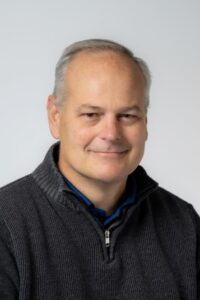
- This event has passed.
Physics colloquium-“Controlling Spin and Light at Room Temperature in Lead-Halide Inspired Hybrid Semiconductors”
February 14, 2023 @ 4:00 pm - 5:00 pm
Matt Beard
National Renewable Energy Laboratory (NREL)
Abstract: In this presentation I will discuss our studies of controlling the charge carrier dynamics, light/matter interactions, and spin populations in metal-halide organic/inorganic hybrid systems. Lower dimensional perovskites are of particular interest since the lower degree of symmetry of the metal-halide connected octahedra and the large spin-orbit coupling can potentially lift the spin degeneracy. To achieve their full application potential, an understanding of spin-relaxation in these systems are needed. Here, we report an intriguing spin-selective excitation of excitons in a series of 2D lead iodide perovskite (n = 1) single crystals by using time- and polarization-resolved transient reflection spectroscopy. Exciton spin relaxation times as long as ~26 ps at low excitation densities and at room temperature were achieved for a system with small binding energy, 2D EOA2PbI4 (EOA=ethanolamine). We have recently studied and developed a novel class of chiral hybrid semiconductors based upon layered metal-halide perovskite 2D Ruddlesden-Popper type structures. These systems exhibit chiral induced spin selectivity (CISS) whereby only one spin sense can transport across the chiral layer and the other spin sense is blocked for one handedness of the chiral perovskite layer. We show that chiral perovskite layers are able to achieve > 80% spin-current polarization. We have also studied spin-injection from the chiral-layer to a non-chiral perovskite layer and find high spin-injection efficiency. We developed novel spin-based LEDs using non-chiral perovskite NCs as the light emitting layer that promotes light emission at a highly spin-polarized interface. The LED spin-polarization is limited by spin-depolarization within the MHP NCs. Finally, if time permits I will discuss our efforts for developing novel photocatalyst by combining the unique properties of metal-halide semiconductor nanocrystals with transition metals transition metal catalyst that is incorporated at the surface of the NCs. We show that such systems can drive multiple electron reactions. These results demonstrate that the emergent properties of organic−inorganic hybrid systems offer unique opportunities in controlling light, charge and spin.

Bio: Matthew C. Beard is a Senior Research Fellow at the National Renewable Energy Laboratory and is Director of the Center for Hybrid Organic Inorganic Semiconductors for Energy (CHOISE) an Energy Frontier Research Center funded by the Office of Science within the US. Department of Energy. He is a fellow of the American Physical Society, the Royal Society of Chemistry, and AAAS. He received his Ph.D. in physical chemistry from Yale University in 2002. His research interest includes hot-carrier utilization (slowed hot-carrier cooling and multiple exciton generation), spin-to-charge conversion, quantum dots, metal-halide perovskites, and other reduced dimensional systems for solar energy transduction, photochemical energy conversion, and the use of ultrafast transient spectroscopies in tracking energy conversion processes.
All lectures held in CoorsTek 140 unless otherwise noted
